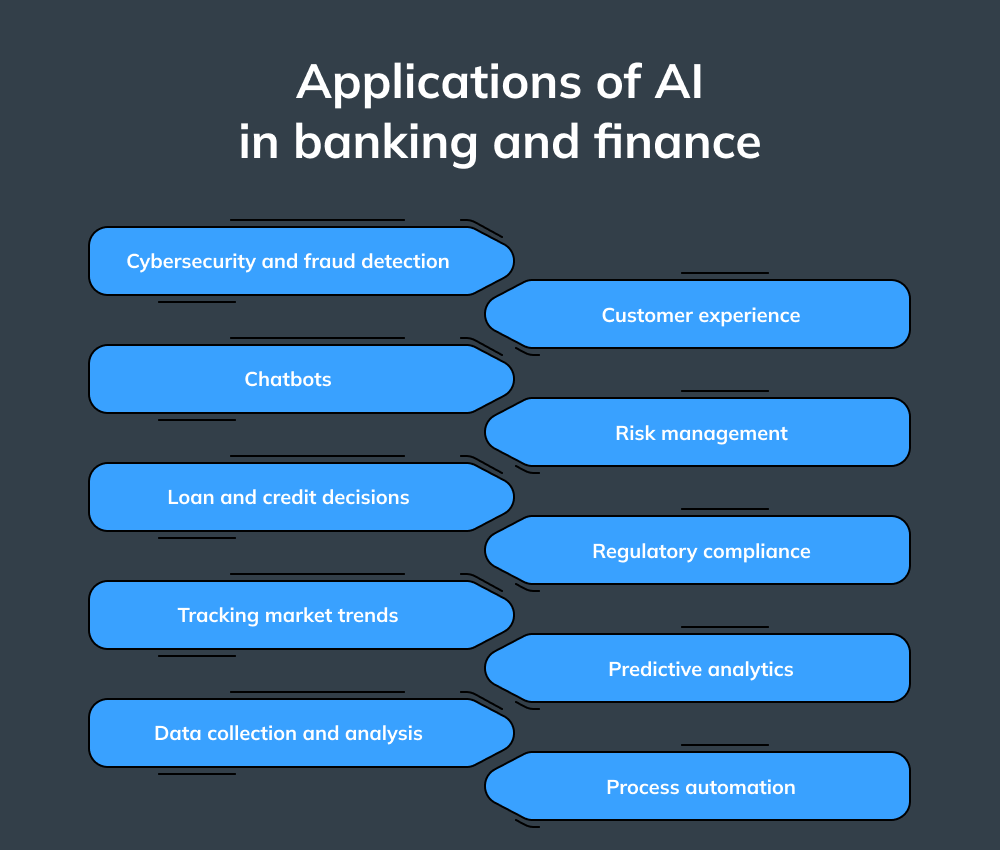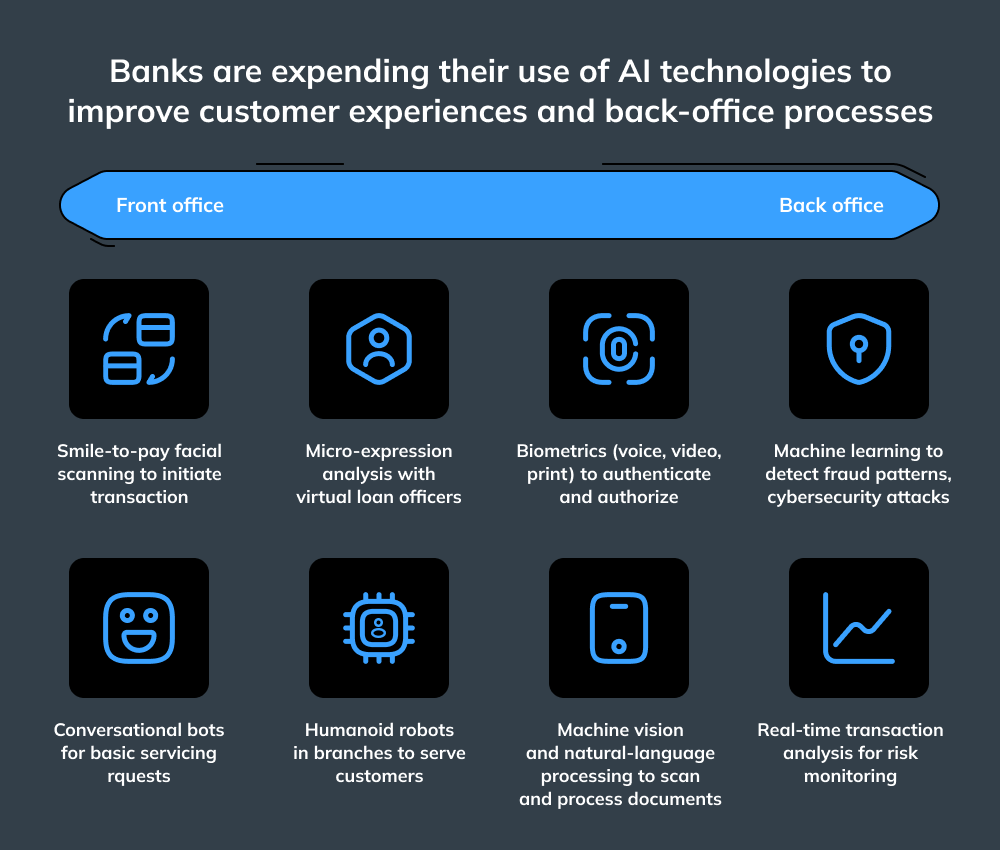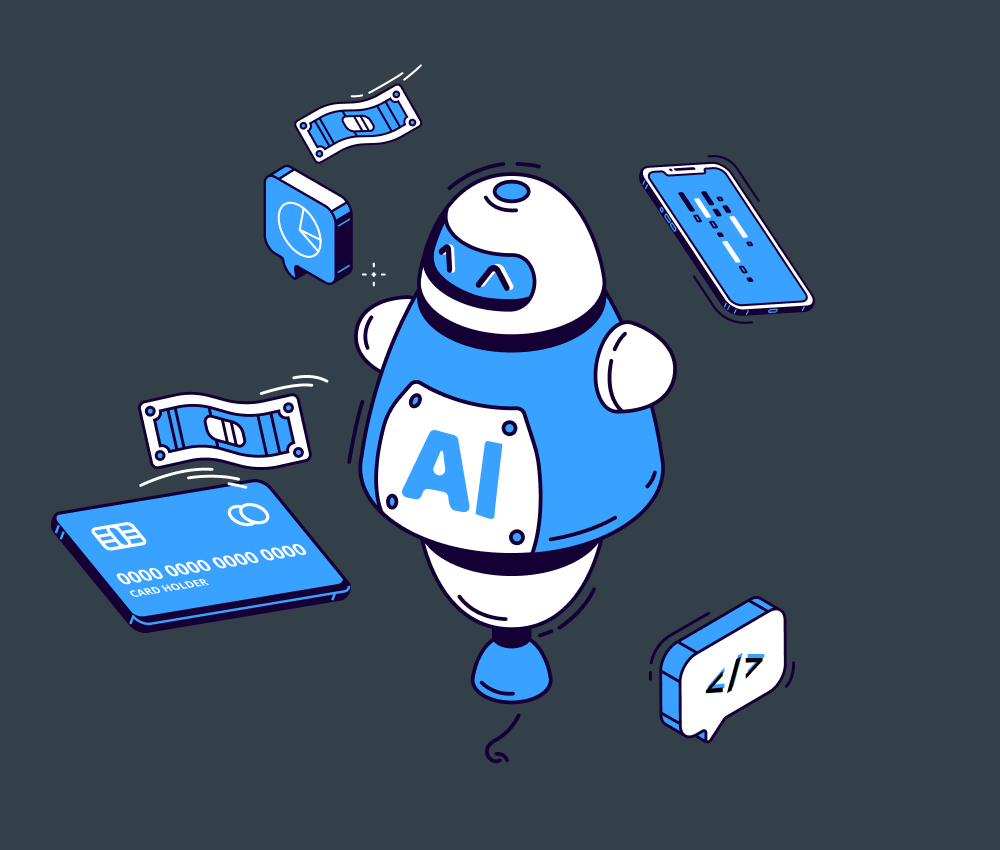Applicazioni dell'IA nel settore bancario e finanziario
L'intelligenza artificiale è entrata a far parte del tessuto quotidiano delle nostre vite, trasformando i settori in modi che solo pochi anni fa potevamo immaginare. Negare la sua importanza sarebbe miope: il settore bancario e finanziario, in particolare, ha visto enormi cambiamenti grazie alle innovazioni FinTech, che hanno portato una serie di vantaggi sia agli stakeholder che ai clienti.
Sicurezza informatica e rilevamento delle frodi
Ogni giorno, milioni di transazioni passano attraverso il sistema bancario: persone che pagano bollette, depositano denaro, prelevano fondi, incassano assegni e altro ancora. Dietro le quinte, le banche sono in costante corsa per stare davanti ai criminali informatici, intensificando i loro sforzi di sicurezza per proteggere le operazioni e i beni e per fermare le attività fraudolente prima ancora che abbiano la possibilità di verificarsi.
L'intelligenza artificiale è ora un giocatore chiave in questa partita ad alta posta. Le banche possono sfruttare il potenziale dell'intelligenza artificiale per migliorare i pagamenti digitali, rilevare le vulnerabilità del software, identificare i comportamenti sospetti dei clienti, riducendo al contempo il rischio di truffe. L'apprendimento automatico, un sottoinsieme dell'IA, aiuta a rilevare e prevenire azioni illegali come il phishing via e-mail, le frodi su carte di credito e cellulari, i furti di identità e le false richieste di risarcimento assicurativo.
Prendiamo la danese Danske Bank, che ha recentemente aggiornato il suo obsoleto software di rilevamento delle frodi con moderni algoritmi di intelligenza artificiale. Grazie alla capacità dell'intelligenza artificiale di analizzare le transazioni passate (si pensi alle informazioni personali, ai dati, all'indirizzo IP, alla posizione e così via), la banca ha registrato un aumento di 50% nell'accuratezza del rilevamento delle frodi e una riduzione di 60% dei falsi positivi. Poiché le banche sono i primi obiettivi degli hacker, l'adozione diffusa di ML e AI è fondamentale. Queste tecnologie aiutano le organizzazioni finanziarie a rispondere rapidamente alle minacce digitali, rafforzando le difese contro i cyberattacchi prima che compromettano i sistemi interni, i dipendenti o i clienti.
Chatbot
L'utilizzo dei chatbot nel settore bancario è uno degli esempi più semplici di implementazione dell'IA. Una volta implementati, saranno disponibili 24 ore su 24, a differenza del personale umano con orari fissi e necessità di pause regolari. I chatbot non si limitano a rispondere alle domande con risposte univoche: imparano dalle interazioni con i clienti, accumulando un bagaglio di conoscenze che consente loro di prevedere le esigenze degli utenti e di adattare le risposte di conseguenza. Integrando i chatbot dotati di intelligenza artificiale nelle app bancarie, i gestori possono essere certi che i loro clienti ricevano un'assistenza personalizzata 24 ore su 24, 7 giorni su 7, con prodotti e servizi personalizzati in base alle esigenze individuali.
Un esempio di chatbot di successo è Erica: un assistente virtuale dotato di intelligenza artificiale della Bank of America. Dal 2019, Erica ha gestito oltre 50 milioni di richieste dei clienti, dall'aiutare i clienti a ridurre il debito della carta di credito all'aggiornare la sicurezza della carta.
Decisioni di prestito e di credito
Oggi le banche utilizzano un'ampia gamma di strumenti intelligenti per migliorare l'accuratezza, la precisione e la redditività delle loro decisioni in materia di prestiti e crediti. I software bancari convenzionali sono spesso inadeguati, afflitti da errori, imprecisioni nelle cronologie delle transazioni e classificazioni errate dei creditori. Le organizzazioni finanziarie devono monitorare attentamente le storie di credito e le referenze dei clienti quando estendono il credito e valutano la solvibilità di individui o aziende. I sistemi basati sull'intelligenza artificiale analizzano i modelli di comportamento dei clienti per prendere decisioni guidate dai dati sull'affidabilità creditizia, avvisando tempestivamente le banche di eventuali attività sospette o rischiose.
Esperienza del cliente
I clienti si aspettano un'esperienza d'uso intuitiva e priva di complicazioni quando gestiscono le loro applicazioni bancarie. Sono finiti i tempi in cui era necessario recarsi in una filiale bancaria per operazioni semplici come depositi e prelievi, grazie alla comodità degli sportelli automatici.
Al giorno d'oggi, con una popolazione sempre più esperta di tecnologia, le banche devono innovare continuamente per fornire soluzioni di pagamento digitale rapide e sicure. L'intelligenza artificiale aiuta a ridurre i tempi di registrazione delle informazioni KYC e a eliminare gli errori, a snellire il time-to-market dei prodotti e a risolvere in modo proattivo i problemi pre-lancio prima che si presentino.
Come se non bastasse, richiedere un prestito personale non è mai stato così facile. I clienti non devono più affrontare la seccatura delle richieste manuali: L'AI e il ML nel FinTech riducono i tempi di approvazione, acquisendo dati precisi e privi di errori sui conti dei clienti.
Gestione del rischio
Le oscillazioni valutarie, gli sconvolgimenti politici, le catastrofi naturali e i conflitti armati possono provocare scosse nel sistema finanziario e bancario. Durante i periodi di turbolenza, prendere decisioni di investimento sagge è fondamentale per rimanere a galla ed evitare perdite finanziarie. È qui che entra in gioco l'Intelligenza Artificiale: fornendo un'utile panoramica degli eventi attuali, prevedendo le tendenze future e prevedendo ciò che ci aspetta, l'Intelligenza Artificiale aiuta gli investitori a navigare in acque incerte con fiducia. L'IA può anche aiutare a determinare se un cliente sarà in grado o meno di rimborsare un prestito, analizzando i modelli comportamentali, la storia creditizia e i dati personali disponibili.
Conformità normativa
Il FinTech è uno dei settori più regolamentati dell'economia globale. I governi svolgono un ruolo importante come cani da guardia principali, monitorando e supervisionando le banche per prevenire i crimini finanziari, il riciclaggio di denaro e l'evasione fiscale.
I requisiti e gli standard legali cambiano frequentemente, il che significa che le banche devono mantenere reparti ben informati e agili, dedicati alla ricerca e all'implementazione di una legislazione finanziaria in continua evoluzione. Se eseguito manualmente, questo processo richiede tempo e denaro. L'IA: grazie alla potenza dell'apprendimento profondo e dell'NLP, i sistemi di IA possono analizzare rapidamente le nuove normative e valutare i requisiti di conformità, assicurando che le organizzazioni rispettino tutte le leggi esterne e le politiche interne. Sebbene l'IA non possa sostituire un analista di conformità umano esperto, può individuare gli aspetti critici o ambigui della normativa e salvaguardare l'azienda dai rischi legislativi.
Analisi predittiva
Utilizzare l'intelligenza artificiale per l'analisi predittiva è un po' come avere un assistente altamente intuitivo in grado di individuare tendenze e correlazioni che gli esseri umani o la tecnologia convenzionale spesso trascurano. L'IA è ampiamente utilizzata nell'analisi del linguaggio naturale e nella semantica generale, grazie alla sua capacità di individuare rapidamente modelli specifici e correlazioni di dati. Si tratta di una svolta per il settore bancario: le analisi predittive aiutano gli istituti finanziari a definire le opportunità di vendita non sfruttate, a fornire metriche basate sui dati e a rivelare approfondimenti specifici per il settore che possono incrementare significativamente i ricavi.
Perché il settore bancario dovrebbe adottare l'IA?
Il mondo bancario si sta rapidamente spostando verso modelli incentrati sul cliente, che mirano a soddisfarne i desideri, le esigenze e le aspettative. I clienti di oggi vogliono che le loro banche siano disponibili 24 ore su 24, 7 giorni su 7, e che offrano strumenti e funzionalità innovative che rendano la loro esperienza bancaria priva di problemi. Per soddisfare queste aspettative, le banche devono innanzitutto affrontare le sfide interne, come i sistemi software legacy, i silos di dati frammentati, i budget limitati e la scarsa qualità degli asset. Una volta superati questi ostacoli, le banche sono un passo più vicine ad adottare l'IA per i loro problemi quotidiani.
L'intelligenza artificiale non si limita a garantire una sicurezza informatica senza pari, ma rende i servizi finanziari più convenienti e fa risparmiare tempo sia ai clienti che ai dipendenti.
Sfide nell'adozione più ampia dell'IA nel settore finanziario e bancario
È ovvio che l'IA comporta un pacchetto di innumerevoli vantaggi, ma la sua adozione su larga scala è ostacolata da vari problemi, come le lacune in termini di credibilità e i rischi per la sicurezza. Una strategia olistica e un approccio completo all'IA e all'apprendimento automatico in ambito finanziario possono ridurre significativamente questi rischi, aumentando le probabilità di successo e i guadagni finanziari che ne derivano. Nel momento in cui i responsabili delle decisioni navigano nell'entusiasmante mondo dell'IA in finanza, potrebbero incontrare una serie di ostacoli comuni, illustrati di seguito.
Sicurezza dei dati
L'IA raccoglie, archivia e gestisce enormi quantità di informazioni personali sensibili, il che significa che è imperativo per le istituzioni finanziarie stabilire misure di protezione per prevenire le violazioni dei dati e gli accessi non autorizzati. Le banche dovrebbero dare priorità a sistemi di protezione dei dati di ferro quando gestiscono grandi volumi di informazioni legate all'IA, per eliminare qualsiasi rischio e mantenere al sicuro le informazioni riservate.
Mancanza di dati di qualità
La qualità insufficiente dei dati rappresenta una grande sfida per le aziende FinTech. Senza dati ben organizzati, l'applicazione di intuizioni a situazioni reali è quasi impossibile se non corrisponde alla realtà attuale. Inoltre, i dati che differiscono dal formato leggibile dalla macchina possono portare a comportamenti imprevedibili nei modelli di intelligenza artificiale. Le banche che intendono adottare l'intelligenza artificiale dovrebbero modificare - e, se necessario, rivedere - le loro politiche sui dati e introdurre maggiore ordine nei flussi di dati.
Problemi di spiegabilità
Poiché i software basati sull'intelligenza artificiale eliminano gli errori e fanno risparmiare tempo, sono ampiamente utilizzati nelle procedure decisionali. Purtroppo, però, possono avere pregiudizi derivanti da precedenti errori di giudizio umano. Ciò può significare che la reputazione della banca potrebbe essere a rischio se piccole discrepanze nell'IA si aggravano e causano problemi su larga scala. Tutti i dati coinvolti negli scenari di IA devono essere chiari e trasparenti, senza lasciare spazio a potenziali discrepanze.
Come Innowise può accelerare il vostro viaggio nell'IA


















